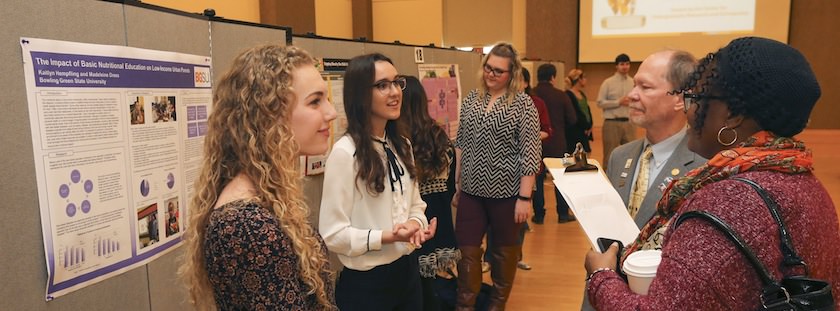Undergraduates share research into diversity, inclusion
Undergraduate researchers who tackled issues related to diversity and conclusion presented their findings Jan. 20 at the second annual Undergraduate Symposium on Diversity: Opportunities and Challenges for the Inclusion of Diversity in Higher Education and Society. The event was organized by the Center for Undergraduate Scholarship and Research, headed by Dr. Cordula Mora. The three top presentations will be honored at a ceremony where the presenters will receive an original glass piece by art faculty member Joel O’Dorisio.
With 45 poster presentations, the event filled the Lenhart Grand Ballroom at the Bowen-Thompson Student Union. The students were eager to share their work, which could have been done as part of a class or as an independent study with faculty.
The issues they studied were often was related to their majors, as in the case of Mary Hemmelgarn, Kaitlin Stankiewicz and Sabrina Weibel, social work majors studying with Hee Soon Lee. For their project, “Mental Health Effect on Children in Foster Care System,” they surveyed 11 Ohio foster care and adoption agencies about the level of mental health services for children in those systems and whether it was believed to be sufficient. The challenges for providing this type of care include long waitlists and access for children in remote rural areas, they found.
“We want to be a voice and an advocate for the kids,” they said.
Likewise, Alexis Kieffer, a junior majoring in social work, was part of a team that looked at “Current Bullying Prevention Programs and Policies in Schools.”
“We wanted to understand what programs and policies are in place, and we found many discrepancies and confusion,” she said. Most worrisome was cyberbullying, which, unlike physical bullying, can’t be seen by classroom teachers but poses serious mental health concerns, Kieffer said. Of the 86 responding school systems, there was lack of clear policy and “most don’t talk about cyberbullying in their policies or give guidelines for acting upon it, and it’s very hard to define and to act upon because it happens outside of school and raises issues of free speech.”
At the other end of the life spectrum are the elderly, who can suffer from misunderstandings about them by younger people. Sophomores Amber Knecht and Victoria Hirsel surveyed BGSU students from different colleges for their project on “Stigma and Older Adults” as part of their Research Methods for the Human Services class taught by Laura Fullenkamp, human services. Team members Knecht, a pre-occupational therapy major, and Hirsel, a gerontology major, found varying levels of stigma attached to older people among the colleges.
“We see this as a steppingstone; could taking a gerontology course lower the level of stigma?” Knecht asked. “We hope this will lead to further research.”
Updated: 12/02/2017 12:18AM

